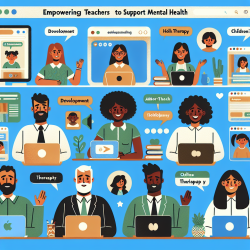Individualized Education Program (IEP) planning and meetings are pivotal components in the journey of a speech therapist. These moments not only chart the course for a student’s progress but also embody the collaborative spirit of educational support. At TinyEYE, we believe that speech therapists can achieve self-actualization by mastering these essential aspects of their role, thereby transforming lives through thoughtful and effective therapy.
As a speech therapist, your expertise is indispensable in the IEP process. Here are key strategies to help you excel in IEP planning and meetings:
1. Preparation is Key
Thorough preparation lays the groundwork for a successful IEP meeting. Start by gathering all relevant data on the student’s progress, challenges, and achievements. This includes:
- Previous IEP goals and their outcomes
- Current performance levels
- Teacher and parent feedback
- Any assessments or evaluations conducted
Being well-prepared ensures that you can contribute valuable insights and recommendations during the meeting.
2. Collaborative Approach
IEP meetings are a collaborative effort involving educators, parents, and other specialists. Approach these meetings with an open mind and a willingness to listen. Foster a spirit of teamwork by:
- Encouraging input from all team members
- Respecting diverse perspectives
- Building consensus on goals and strategies
Collaboration leads to comprehensive and well-rounded IEPs that cater to the unique needs of each student.
3. Clear and Measurable Goals
Effective IEPs are built on clear, measurable goals that are tailored to the student’s individual needs. Ensure that goals are:
- Specific and achievable
- Time-bound
- Aligned with the student’s overall educational objectives
Well-defined goals provide a roadmap for therapy and make it easier to track progress and make necessary adjustments.
4. Effective Communication
Communication is the cornerstone of successful IEP meetings. Be sure to:
- Use clear, jargon-free language
- Explain technical terms and concepts
- Ensure that parents and guardians fully understand the plan
Effective communication fosters trust and ensures that everyone is on the same page regarding the student’s educational journey.
5. Embrace Technology
In today’s digital age, technology can be a powerful ally in the IEP process. Online therapy services, like those offered by TinyEYE, provide flexible and accessible solutions for delivering speech therapy. Embrace tools and platforms that facilitate:
- Remote assessments and evaluations
- Virtual IEP meetings
- Ongoing communication with parents and educators
Technology can enhance the effectiveness of your interventions and ensure continuity of services, regardless of physical location.
6. Reflect and Adapt
IEP planning and meetings are dynamic processes that require continuous reflection and adaptation. After each meeting, take time to:
- Review the outcomes and feedback
- Identify areas for improvement
- Adjust your strategies as needed
Continuous improvement ensures that you are always providing the best possible support to your students.
By mastering IEP planning and meetings, speech therapists can truly realize their potential and make a profound impact on the lives of their students. At TinyEYE, we are committed to supporting you in this journey by providing innovative online therapy services that empower you to deliver exceptional care.
Embrace these strategies, and you will not only excel in your role but also inspire others with your dedication and expertise. Together, we can create a brighter future for every student.










